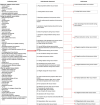Physical and mental health problems of Chinese front-line healthcare workers before, during and after the COVID-19 rescue mission: a qualitative study
- PMID: 36302581
- PMCID: PMC9620522
- DOI: 10.1136/bmjopen-2021-059879
Physical and mental health problems of Chinese front-line healthcare workers before, during and after the COVID-19 rescue mission: a qualitative study
Abstract
Objective: To explore the physical and mental health problems of front-line healthcare workers fighting COVID-19 across the three phases of the epidemic rescue mission (before, during and after) in China.
Design: A qualitative study was adopted using face to face, in-depth semistructured interviews. Phenomenological research methods and Colaizzi's seven-step analysis method were used in the study.
Setting: The setting of the study was the offices of healthcare workers in 12 tertiary hospitals.
Participants: Thirty-one front-line healthcare workers from 16 provinces in China, who carried out rescue missions in Hubei Province, were interviewed from October to November 2020.
Results: Physical and mental health problems existed before, during and after the COVID-19 rescue mission. Eleven themes emerged during the three phases. Two themes appeared before rescue mission: basic diseases, anxiety before rescue mission. Five themes appeared during rescue mission: basic physical function disorder, physical exhaustion, negative cognition, negative emotions and negative behaviour. Four themes appeared after rescue mission: physical dysfunction, negative emotions, stigmatisation and hypochondriasis.
Conclusion: Both physical and mental health problems occurred throughout the three phases. The study results pointed that a comprehensive prevention and control system that addresses both physical and mental health problems of front-line healthcare workers throughout the three phases of epidemic rescue mission (before, during and after), and that involves themselves, their families, hospitals, the government and social organisations is needed.
Keywords: COVID-19; mental health; qualitative research.
© Author(s) (or their employer(s)) 2022. Re-use permitted under CC BY-NC. No commercial re-use. See rights and permissions. Published by BMJ.
Conflict of interest statement
Competing interests: None declared.
Figures
Similar articles
-
Working conditions and health status of 6,317 front line public health workers across five provinces in China during the COVID-19 epidemic: a cross-sectional study.BMC Public Health. 2021 Jan 9;21(1):106. doi: 10.1186/s12889-020-10146-0. BMC Public Health. 2021. PMID: 33422035 Free PMC article.
-
The effect of hindrance stressors on the emotional exhaustion among front-line healthcare workers in the recuperation period during the COVID-19 epidemic in China: a prospective cross-sectional study.BMJ Open. 2022 Jun 23;12(6):e049191. doi: 10.1136/bmjopen-2021-049191. BMJ Open. 2022. PMID: 35738647 Free PMC article.
-
Physical and psychological status of emergency assistance personnel at major public health events: a qualitative descriptive study.BMC Public Health. 2024 Jul 18;24(1):1929. doi: 10.1186/s12889-024-19367-z. BMC Public Health. 2024. PMID: 39026258 Free PMC article.
-
What We Have Learned from Two Decades of Epidemics and Pandemics: A Systematic Review and Meta-Analysis of the Psychological Burden of Frontline Healthcare Workers.Psychother Psychosom. 2021;90(3):178-190. doi: 10.1159/000513733. Epub 2021 Feb 1. Psychother Psychosom. 2021. PMID: 33524983 Free PMC article.
-
Mental health problems of front-line medical staff in the early stage of public health emergencies.Front Psychiatry. 2024 Apr 26;15:1377815. doi: 10.3389/fpsyt.2024.1377815. eCollection 2024. Front Psychiatry. 2024. PMID: 38736629 Free PMC article. Review.
Cited by
-
Changes in primary healthcare workforce burnout during and after the termination of COVID-19 emergency response: A one-and-half-year observational study.J Family Med Prim Care. 2025 Jan;14(1):126-131. doi: 10.4103/jfmpc.jfmpc_891_24. Epub 2025 Jan 13. J Family Med Prim Care. 2025. PMID: 39989571 Free PMC article.
-
The Effectiveness of Debriefing on the Mental Health of Rescue Teams: A Systematic Review.Int J Environ Res Public Health. 2025 Apr 9;22(4):590. doi: 10.3390/ijerph22040590. Int J Environ Res Public Health. 2025. PMID: 40283813 Free PMC article.
-
Psychological experience of university students during prolonged quarantine in China: a qualitative study.BMJ Open. 2024 Mar 11;14(3):e077483. doi: 10.1136/bmjopen-2023-077483. BMJ Open. 2024. PMID: 38471689 Free PMC article.
-
Influencing factors on the psychosomatic health of medical staff since the normalized stage of COVID-19 in mainland China.Eur J Public Health. 2024 Jun 7;34(3):600-605. doi: 10.1093/eurpub/ckae021. Eur J Public Health. 2024. PMID: 38423544 Free PMC article.
-
Impact of a Single Virtual Reality Relaxation Session on Mental-Health Outcomes in Frontline Workers on Duty During the COVID-19 Pandemic: A Preliminary Study.Healthcare (Basel). 2025 Jun 16;13(12):1434. doi: 10.3390/healthcare13121434. Healthcare (Basel). 2025. PMID: 40565461 Free PMC article.
References
-
- World Health Organization . Coronavirus disease (COVID-19) outbreak situation, 2021. Available: https://www.who.int/emergencies/diseases/novel-coronavirus-2019
Publication types
MeSH terms
LinkOut - more resources
Full Text Sources
Medical

